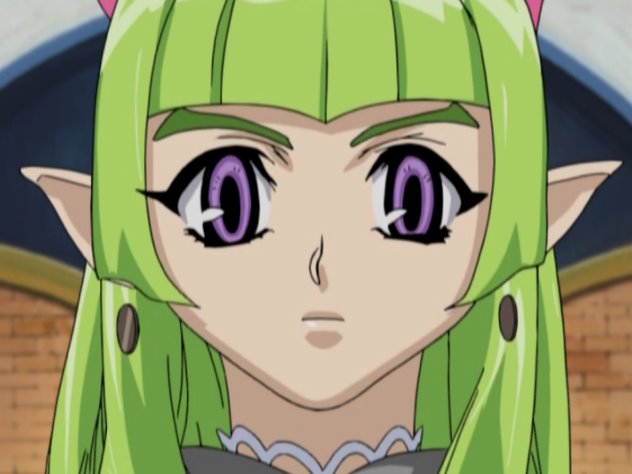May 30, 2008
I need help with a word. I have heard it a couple of times now in Tenchi Muyo: GXP and it sounds to me like anshisute, and as pronounced the "u" is dropped. That's obviously the imperative form of some verb. The first time they translated it as "don't worry" and the second time as "relax". What is the infinitive form of the verb they're talking about?
I figured out that 安心 anshin means "relief, peace of mind" but it's a noun. What is the verb they're using?
Actually, I think I'm wrong about it being an imperative. Looks like a gerund, except that it should be -shite instead of -shisute. Probably what I'm hearing is an idiom. Anyone have any idea what it is?
UPDATE: When Neige gets serious, she really scares me.

She play-acts the loli most of the time, so it's easy to underestimate her.
Seto toys with the other four, but never tries to play her mind-games with Neige. I think that's because Neige would, figuratively speaking, have Seto in a hammerlock almost immediately if Seto were stupid enough to take her on.
Posted by: Steven Den Beste in Japanese at
08:43 PM
| Comments (7)
| Add Comment
Post contains 150 words, total size 2 kb.
Posted by: Pete Zaitcev at May 30, 2008 09:23 PM (qNSKg)
I wonder if what I was hearing was a regional accent, then, or pronunciation drift. The "n-sh" definitely had drifted to become an "s", but that's the kind of thing that can happen. (The English analogy is the way that "going to" has become "gonna".)
So while I've got your attention, I've heard another one. Sounds to me like wauri and they translate it as "sorry". I just now heard it in TM:GXP and I've also heard it in DBZ.
Posted by: Steven Den Beste at May 30, 2008 09:42 PM (+rSRq)
Posted by: HC at May 31, 2008 02:22 AM (3BXdo)
Posted by: Steven Den Beste at May 31, 2008 05:31 PM (+rSRq)
I often find very close affinity between Japanese written characters (the Kanji, i mean) and the Chinese definitions, even though the pronunciation usually differs. Which makes sense, I guess. This one seems to be directly transferred, characters, meaning, and pronunciation. Interesting.
Posted by: dkallen99 at June 01, 2008 04:37 PM (v7cLT)
Sometimes the Chinese meaning of the kanji is a big hint. Probably more often than not, in fact.
But it's not uncommon at all for kanji to be used strictly phonetically, without regard for the Chinese meaning. That's pretty much the rule in names, but it happens in other places, too.
My favorite example of that is 馬鹿野郎
馬 ba horse
鹿 ka deer
野 ya civilian life
郎 rou son
The whole is baka yarou which means "stupid scoundrel". In practical use it's just a stronger form of baka, the all purpose insult. It's apparent that it has little or nothing to do with the literal meaning of the kanji. They've been used phonetically.
I don't have any examples to hand, but when I'm scrounging in the dictionary I commonly come across cases where the same word, with the same meaning, can be spelled more than one way, using different kanji. The kanji in question are not close in meaning, and it's apparent that these are cases of homonyms where a standard spelling hasn't been nailed down. In those cases, too, the kanji are being used phonetically rather than for meaning.
As to anshin 安心 it's a noun. (If Babelfish made it "relieved" then it's blown the part of speech, because "relieved" is a participle.) One meaning of it does refer to Buddhism, but that one is pronounced anjin rather than anshin.
Posted by: Steven Den Beste at June 01, 2008 07:27 PM (+rSRq)
Also, language is a living thing. Words change in meaning over time. The kanji used in Japanese were borrowed from China a long time ago, several centuries. There was a long period of mutual contempt in which there was not much cultural cross-mixing, and during that time some kanji in Japan drifted in meaning, in some cases by quite a lot.
So even in some cases where a kanji is used for meaning, it still doesn't mean what the Chinese would think it meant.
Posted by: Steven Den Beste at June 01, 2008 07:30 PM (+rSRq)
Enclose all spoilers in spoiler tags:
[spoiler]your spoiler here[/spoiler]
Spoilers which are not properly tagged will be ruthlessly deleted on sight.
Also, I hate unsolicited suggestions and advice. (Even when you think you're being funny.)
At Chizumatic, we take pride in being incomplete, incorrect, inconsistent, and unfair. We do all of them deliberately.
How to put links in your comment
Comments are disabled. Post is locked.21 queries taking 0.0105 seconds, 24 records returned.
Powered by Minx 1.1.6c-pink.
